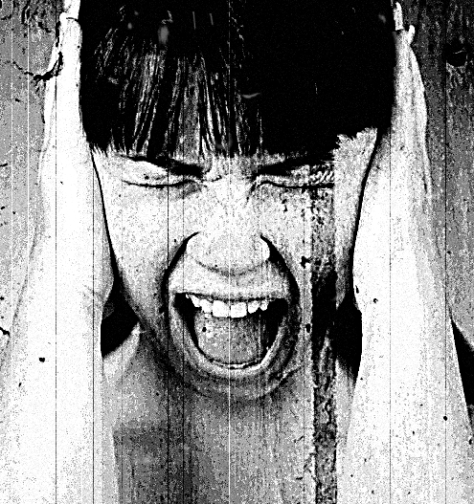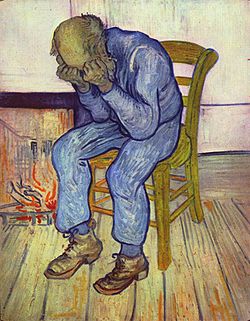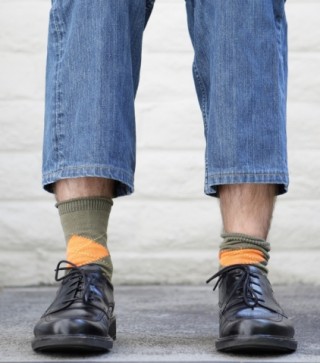How did I come to be here in this place of icy coldness and such utter darkness? Oh, blackest shadow of all shadows, which engulfs me, is there no light that shines within you. How did I arrive in your gut? How did I come to be in such an inhospitable realm of dark, icy, unfriendliness?
I recall I was at home with my family. We were all in the living room and watching television after dinner as we always do. I sat in my overstuffed high back chair watching television with my wife and the girls. Today was an ordinary day just like any other day.
No, wait… something odd happened did transpire. I recall something quite bizarre happening in the living room. However, that was all just a ridiculous dream. I must have dozed off watching television as I often do after a stressful day and a large dinner.
I must admit that the dream was indeed quite vivid. A more superstitious man might think it had truly been real…that what happened in the living room in fact really happened… However no, that is all preposterous! It all had to be a dream.
Yes, and perhaps I am still dreaming the very same vivid, outrageous, dream this very second. Except, now the dream has changed, and instead of being in the living room, I am now dreaming I am here, in a realm of utter black, I can find no light anywhere, and I am shivering in this icy void…It is all one big dream.
Yes, that would explain everything that happened since dinner until right now. I fell asleep in the chair. I am still asleep in the chair and dreaming. All I have to do is work my way back to when this all started. Then I can wake myself up.”
Going back to the beginning… I was in my chair watching television. Barbara and the kids were there with me in the living room. I was desperately trying to calm down after a very nerve-wracking week at the office. I was very irritable and tense. My neck was in knots.
In the background, my daughters were arguing. The fight was about whose turn it was to choose what we would watch on TV tonight. My daughters Stephanie and Rachel both swore it was their turn to choose the program for tonight. The two would not stop bickering. I was getting more and more irritated.
My daughter Becky was not involved in the fight. Yet she was driving me to madness by sitting back in her chair and banging the back of her head against the wall incessantly.
Suddenly pains started shooting down my right arm…Stephanie and Rachel were bickering loudly, but I could not quite understand what they were saying. Their voices sounded as if in a tunnel.
Everyone stopped fighting and regarded me oddly. Everyone watched me standing in front of the television. I started to perspire and felt woozy. I lost my balance briefly and had to put my hands on my knees.
“Dear, are you all right? You look pale. Why don’t you sit down for a minute?”
At that instant, I felt like a thunderbolt struck me in the chest. It knocked the breath out of me. I felt as if a horse kicked me. This agony lasted several minutes. It became unbearable.
I had the strange sensation of sinking. Nevertheless, I was standing on my feet in the living room.
Then, all of a sudden, all that pain was gone. I grew quite serene and wonderful warmth filled me. I felt safe through and through my existence. It was as if all of the stress was gone and nothing could touch me. At that time, I became profoundly sleepy. Everything faded to black.
However, this somnolence melted away leaving me in a state of intensive wakefulness. That is when the bizarre part of this dream started to happen…it was the queerest thing of all; I was just standing there as if nothing ever happened.
I was standing there in the living room, fit as a fiddle, fine as you please, while at the same time, I was looking down at the living room floor, beholding my own body lying at my feet.
As I stood, it was as if ropes bound me. That is I could not move from where I stood. I was a sort of passive observer, almost like a statue, looking down at my body lying on the floor.
I saw my wife and my three daughters. All of the girls were frantic and I could not comprehend why they were all down on all fours and gathered around my body. I tried to speak to them, to comfort them. I wanted to tell them I was standing right next to them and that I was perfectly well. However, when I spoke to them I was mute. It was as if I had no voice box. I could not make a sound.
I saw my body’s arms and legs splayed open, rigid. The appendages lay sticking out underneath the girl’s arms and legs. Stephanie, Rachel and Becky were hysterical. One was shaking my left leg and the other two were tugging at my arms.
As I stood erect above this whole scene, I observed as Barbara desperately began to shake my body. My body moved back and forth when she shook it, but it only moved mechanically, simply echoing the exertion of the forces she applied. Nevertheless, Barbara kept shaking my body, speaking wildly and incoherently. I tried to reassure Barbara, to calm her. However, I was confounded as once again, I was mute.
Barbara finally stopped shaking my body and stopped. All was still and there was a lull for several long seconds. My wife and daughters became still and silent. I was glad that they had calmed down.
Then all at once, everyone in the room began to scream out in a sort of primal hysteria, like wailing animals. Altogether, this sounded as if it was a surreal recognition of some sort of utter despair—so again, I was befuddled, for I was entirely well. In addition, as I suspected, when I tried speaking to console the girls I could not communicate. No sound passed my lips.
I had to stand there silently, helplessly, like a sculpture and watch them suffer. I saw the girls weeping, Stephanie was howling. I saw Barbara run to get the phone, she dialed, and then she returned to my body on the floor. She had her one hand on her forehead talking almost incoherently into the phone. She finally hung up and dropped the phone on the living room floor beside my body.
All of the family hesitantly gathered around my motionless body. They touched it lightly while they cried. The girls hugged one another while they wept. It was quite upsetting to watch my loved ones suffer needlessly.
That is all I remember and that was the end of my completely bizarre dream. No, wait I recall one more thing…the falling…I fell endlessly.
At one moment, I stood beholding my body with the family crying around it. Then unexpectedly, the floor caved in below my feet where I stood. I fell through the living room floor. I fell down, beneath the house, and I continued to fall, dropping away from the whole scene, and down into blackness. I fell down beneath the crust of the earth. I fell fast, dropping down unimpeded. It seemed that I fell forever.
During the entire event, my mind became weary and I must have dropped off into a deep sleep again. Because I remember, I began dreaming again. It was a mild nightmare of sorts. I dreamed that I saw a single white burning candle; the candle was in an old-fashioned metal holder with a ring for the finger—the kind of candleholder people used to carry around by hand to see in the pitch-black darkness long before incandescent lighting.
I dreamt I saw this candle in the carrier sitting on a rock-covered floor. The candle was all alone, and burned with a feeble, trembling flame. I watched the burning candle anxiously, as the tiny yellow tongue of fire fluttered like a flag rippling and folding in furls, waving in a hard wind. I watched powerlessly while that flame tried to survive, tremulously clinging to the wick in the blowing wind. For some reason I was terrified that this flame would be blown out.
Suddenly I awoke from that silly nightmare. That is the moment I first realized that I was standing here in the unknown dark, cold place where currently stand. That explains the bizarre imagery and dreams preceding right now. However, it does not adequately explain why I am here in this inky artic void.
I either dreamed this whole thing, and I am still dreaming right now—or, the unthinkable explanation; I was never dreaming at all, and everything that I recall actually happened. All I know for sure is that not being able to wake up is scaring me witless.
If I am not dreaming and this is really happening, where could I be? I am no longer in my home. I have no clue of the location or nature of this black abode. I might think I was inside a sepulcher but no, this is somewhere else. I wonder if it is merely black all about me, or if I am now blind. It strikes terror in me to have no sight in this realm of plucked out eyes.
In addition, in this bone chilling cold, my shuddering jaw shakes as my teeth rattle and knock off one another until they chip. My unseen breath blows an invisible ragged cloud of artic steam into the blackness.
To add to the misfortune, to my jeopardy I find that am standing with naked feet, anguishing in misery on a flooring of vicious stones with cut edges. To walk one just one of these razor-sharp stones would be perilous. However, if I do not start moving I will freeze to death. Therefore, I force myself to take just two steps.
The jagged flint edges cut deep into the soles of my feet. I bite my lower lip in bitter agony. Unseen crimson in the blackness stains the bottom of my feet with blood. Oh damned, execrable place, I heap curses upon you, and I spit upon your floor of cruel stones with scorn!
A cold chill runs me through and through. I frenzy in a fit of wild mental agitation. I swipe my arms about aimlessly in the void seeking walls, hanging things, anything to scrape with my fingernails. I am all affright.
With great effort, I allow the panic to flow through me and go out. I regain my faculties. My hands are empty despite all my grasping in the dark cold all about me.
There would appear that there is nothing here. Yet, I have a superstitious mindfulness that something is indeed here in the inky black with me. Another rush of panic washes over me like a bucket of icy water poured down on me. I turn round about looking wildly for light. My bare feet tear on piercing stones, the heels bruise. My feet are torn, crimson runs black and invisible from my feet.
May the gods, just give me a small crack of light to chase,
Let them me a thread of hope for flight from this place.
My startled heartbeat is drumming in my ears. Its beat is irregular and panicked. Its drubbing bangs in my head. In my cranium, it rings like and old well pump with a clanking metal handle. It spurts out blood from the wellhead just as it gurgles in my veins.
Give me a fleeting pinpoint of light. I need to know. Do I have eyes that see in darkness? If not, do I exist with eyes plucked out of my head? Tell me do I have eyes! This unknown abode is driving me mad.
I suddenly have the uncanny feeling that Death is upon me. Yes, by my sixth sense I swear that Death skulks about me perilously the void. It is as if Death was a beast hunting me in its lair. I feel like its quarry however, I cannot make out the predator in the dark.
Should I pray to God? No, do not be absurd. There is no God or man would not have such abundant suffering on Earth. I will not waste my thoughts with God just because I am afraid. I must fair this dark abode alone. So I must think. What do I know?
I know without a doubt the creature known as Death is here. I sense its presence. Yet for some reason it does not touch me. Is it mocking me, does it want to needle my fear?
I sense that this beast is trailing me closely. I swear his long bony hand reaches just ahead of me. Its palm cupped parallel to my face; the bones of its skeletal hand move like long, arthritic piano keys as its grasp clenches silently in front of my non-seeing eyes. I cannot see the creature, I cannot touch it, but I know Death’s open hand is just beyond my lips.
The primitive pillager is piqued with curiosity. Thoughts of ripping at my face enchant the creature’s instincts. The Beast with its crooked finger traces above the contours of my face while not quite touching them. He seems enamored by their curves. What is this perverse abomination? This monster regards my face with a cruel besmirched finger.
I am lost in Death’s lair, as I walk from the beast. No matter how far I painfully tread on these stones like axe blades, the marauder trails me everywhere. In my every effort, I desperately search the black obscurities of this realm for some exit. My feet are weeping from piecing anguish.
Thick gelatinous blood clots coagulate between my toes in the bitter cold. Nevertheless, I must press on to keep from freezing. I must pace onward, one excruciating stride at a time to keep away from the hideous creature tracking me. My feet’s hide is flayed open.
I walk.
I am without sight but I can smell the moldy odor of the damned creature. As I feel Death draw close, I smell its putrefying flesh. This stench adulterates the air, and the smell of rot floats about me in this cavernous realm. These disgusting fumes swirl and twist, biting at my nostrils like scavenging vines.
The revolting stink makes me gag. Suddenly I bend over. I begin to vomit, and then wrench out dry heaves upon the jagged rocks. I shiver; I am as chilled as a tombstone. I must keep moving; otherwise, the one that strikes terror in my heart will seize me. I also must keep moving or suffer death frozen hard in my tracks.
I walk
A lightning bolt of Panic strikes me. Curses from Hell, what is this! I feel something touch me…it is the beast! I scream as Death vulgarly runs something of rot down along my spine. It must be the tyrant’s perverse, skeletal finger. The thing of terror that haunts me in this black arctic void extends one bony finger. It taps me at the nape of my neck. Slick festering flesh falls off the finger and sticks to my flesh. That odious fetid appendage, chilly upon my flesh, travels tracing a sticky line down my backbone.
I shout. However, my call is mute. No sounds travel across my lips. The scream is only audible to me. I hear my scream alone. It is as a shrill, piercing, primal cry of a desperate prey. A panicked last plea of the victim offered for the mercy in the last second of attrition of the predator. The outwardly silent scream is shrieking aloud in my head.
The noise, vaulted inside the bones of my skull is deafening. Within the folds and contours of the gray matter in my brain, the scream resonates in the recesses of my mind. The disconcerting animalistic shriek goes echoing through my neurons, jumping from synapse to synapse, ringing out unendingly.
The tyrant that haunts me is evil; its resolve is pitiless. To achieve the means to its end Death is methodic, relentless, and most cruel of all, infinitely patient.
My body wrenches, startled and alarmed as I hear the monster roar furiously. Its low base snarl is a rattling knock that echoes as the tigers that roar in the jungle.
When I feel the creature’s cold, humid breath on my back, I stumble and fall face down on the blades of stone. It is another painful and futile attempt in which I fail to evade my stalker. I cut my hands forcing my lacerated body back up and I painfully stand. I must move on.
I walk
Yet I still smell Death. I sense the indifference of the creature in the stench of its decaying breath. I feel the oppressor’s exhalations on my back—each one manifests in goose bumps on the top of my forearms arms and on the back of my neck. The follicles on my scalp tingle in the cold panic and my hair rises as I tremble in terror.
As I feel the Animal digging in-between my shoulder blades with its long twisted, finger. I wrench my body away and stumble forward. My brow sweats beads of cold, salty terror. A briny drop runs down my cheek, invisible in the icy blackness that engulfs me. Sealed in the lair of Death I am desperate and vulnerable to curses of desperation and terror.
The ogre of Death behind me sucks loud, rattling, strings of mucous inside its lungs as they pull in the icy air. The gunge is thick and the stomach-turning knocks of loose phlegm sound like the death rattle of an old dying man.
How many souls has Death liberated from living bodies? Mortal life is a debt everyone must pay to the reaper in time. Yet everyone evades the beast when he or she can, it is our nature.
Death is a foul wisp of air. Death draws into its lungs the fatal breath, the breath that when blown from its cracked lips will snuff out the flickering flame of the candle of a human’s mortal life. This is a flame so effortlessly extinguished. When one is in the face of the beast, their candle’s flame of life becomes a trembling, yellow flag of surrender. No one wants to die. I do not want to die. I must bear the sharp stones cuts.
I walk
Death is cruel. The tormenter bides its time. It toys with me as if a cat, and I the mouse. Its claws swipe at the air slicing it behind me. It seems entertained by my panic as I desperately attempt to flee in the pitch-black murky lair of this impossible maze.
I am wandering blindly, slogging around in patterns in this maze. I painfully stagger, going back over the same futile paths in my desperation to escape. I am relentlessly approaching dead ends in the maze of Death’s lair. At the end of every route, a snare of peril in the dark and stony cold awaits me.
My mortal life’s tenacity, never wanting to yield to the beast of death forces me to press on.
I walk
Oh, my fearful flight, how my feet stumble wearily in alarm. I search for light in this realm of sightlessness in purposeless ineffectuality. Am I blind? I swipe my arms about wildly searching for a shred of hope. Yet I have no optimism in my hands for all my efforts.
How great is the strength of my mortal will? Death is somewhere right behind me in the freezing inky void. I am growing weary. Yet I can never stop.
I walk.
Festering thick saliva drools long from the beast’s unseen fangs. Yet I still exist, I survive just out of reach of the plunderer of life. Yet for all my efforts, I only can stay ahead of the Death’s grasp by mere inches. My debtor is greedy for the payment of my mortal life that is overdue. He purses me incessantly.
I walk.
My heavy naked feet drag as if full of lead; they drag late behind me as I trudge on flint fragments that cut my flesh and mark my heels. The animal pursuing me inhales the aroma of my blood like perfume. Moreover, its appetite lusts for imbibing the gurgling lifeblood that pounds through my temples. Death is behind me.
I walk.
My knees are stiff, their joints unbending. I am moving only by fear pushing me forward. My mortality is faltering. Still I slog on the jagged edged stones and my legs’ endings are now bloody stumps.
My bases torn to the bone, I am walking on skeletal remnants of tarsal and metatarsal bones uncovered, their bruised marrow throbbing. Oh execrable sharp-edged stones, how you are pitiless as your spiteful edges nick my skeleton’s end as I touch the ground. Hear me, my bare bones, move I say, move on!
I walk
I drag on by an ebbing power—I must keep the quivering flame of the candle of my life clinging to the wick.
My limbs bound, rigid, stiff like iron by the severity of agony. The ends of my legs, sluggish with the weight of the earth in them, these bones stumble in a marathon from the wild creature. Oh, bare wearisome chipped bones. My will is weary; still I march by this waning spirit as I flee the animal Death.
I walk.
My blood is feeble of oxygen that does not dwell in this inky place of terror. There is still no light. What did light look like. I cannot remember with the lack of oxygen to my dying brain.
Blue air starved blood, I feel it whoosh, and a pain like throbbing liquid hellfire pulses through my temple veins.
I draw shallow breaths, rapid breaths. I start to perspire in spite of the cold darkness. My forehead oozes beads of bitter, brackish, cold sweat. Still my appendages move on, stiff jointed I drag myself forward. My limbs animated only by fear as my personal monster drives me onward.
I walk
I know nothing except that this beast is lethal, evil, and it is following only inches behind me. It is hunting me, cruelly mocking me, and torturing me with its hideous finger.
What is more, I am so tired. A few more steps and I will lose my last shred of hope. That will be my flickering flames’ peril.
Death readies to devour me. Death purses its lips’ forming that disdainful current of air—oh what a cruel zephyr waits to whorl up into a miasma around the frightened flame.
What is this that I see? It is a stroke of fantastic luck right before I stumble and die. A miracle has occurred. There in the infinite black void—I see a light! Oh wonderful, glorious, life giving light, It is just ahead of me. I approach the light running on exposed skeletal remnants. I come to the source.
This miraculous light in the lair of Death is my glorious candle of life. My fluttering flame is still burning. Now that I am here, I can guard it from the creature that wants to extinguish it. I will stand between Death and my flickering fiery life.
I feel and smell Death behind me. Its horrible beastly breath hits my back and deflects around me. My flame of life still burns! Death cannot hurt me now. It cannot snuff out my candle of life’s flickering flame.
The beast growls behind me with a rattle worthy of the jungle. It is a primeval roar of fury. It is a terrifying roar. However, for all of its ferocity, the beast roars in an impotent rage. The monster is singular in its insignificance now.
Suddenly I see more light. A brilliant rising line of radiant light shines behind the candle on the floor. I walk past the candle to examine the light and I find a wonderful illumination source shining through a vertical crack in the hardest metal I have ever seen. What is more the metal is warm, heated from the brilliant light on the other side. The metal holds this glorious, nurturing warmth as tenderly and loving as the womb.
I place my eye at the vertical line of light in scrutiny. I see that this rising line of light is actually a crack between two colossal metal doors. Peering through I see a universe of infinite light, it is a light for countless more besides me.
I pull at the doors and as they slowly open, they let in a divinely designed light. Life-light of a glowing luminance the likes of which no one has ever seen. It is warm, sweltering and it is burning as brilliant as the sun. Bright and warm, this light is the infinite light of life. I could want no more it is so giving. I step past my candle towards the amazing light.
I walk.
I move on inside the doors. Now I am in the light of lights. Brilliant illumination bathes me in ecstasy. I am free of the inky void and the bitter cold of the lair. Never again will I suffer in the void of darkness. Never more shall I shiver in the cold lair of Death.
I face radiance so bright I cannot bear to look straight at it. I turn around and look back towards the lair of Death. Light shines into the darkness of Death’s realm. Beyond the open metal doors, the light shines into Death’s dark lair. Then I see it.
The beast Death is standing in the shadows behind the open metal doors. It is too hideous; I cannot possibly describe it with words. What an atrocity to the senses. The beast is utter vile repugnance as it stares at me with cold black eyes and fierce fangs. Nevertheless, I stand fearless in the face of death, as it will not approach the light I now stand in. The beast is afraid of the light.
Death snarls at me in anger and the ground shakes with the sound of the roar. However, I am no longer afraid of the beast. Death purses its cracked lips and blows a stream of foul breath. On the floor sits my candle of life burning. Death’s breath reaches the flame on my candle and the yellow trembling tongue of fire flutters. Then the breath suddenly extinguishes the flame. I panic. The flame of my mortal life dies to the cold and blackness.
Nevertheless, I am still standing in the light. I am still now alive. The beast of Death has not taken this brighter source of life from me. I laugh at death, with a mocking superiority. I throw my head back and roar in laughter as I point at the beast, humiliating it.
Death stares at me vile and contemptuous, and I stare right back at the beast. Then Death roars in a rage of defeat, angrily the animal purses his cracked lips and blows so hard the metal doors shut between the two of us. I am victorious. I turn around and face the light. I am in the loving light. I must immerse myself in it.
I walk.
Suddenly light surges out from behind me. Then light flares at my left. It flashes at my right. The brilliant illumination is everywhere around me. I am hot and sweat beads form on my brow. I shield my eyes with my hand and look around. Then I know. There will never be darkness again. Light is all over the place, it is everywhere, there is a universe of life. The light surrounds me.
Suddenly I realize where I am. I know this place.
Illumination upsurges passionately, omnipotent, in a blinding glow.
Then I hear it. The sound I knew I would listen to once I realized where I was. I always wanted to hear the angels in Heaven sing like sirens. Yet I never believed in heaven until now. There is definitely a heaven. I now know it exists.
The light all about me explodes and curls up into the air with long rolling streams of white. I want so much to hear the angels sing. I know now that heaven does exist and God is real. I long for the angels’ mellifluous chorus. Nevertheless, I hear something even more intense.
I hear what I knew I would hear in this place. I hear billions of blood-curdling screams come from within the sun like radiance and searing heat.
This light so brilliant—this is not the light of life. Yes, I know exactly where I am.
I am in Hell.
This is an endless exploding realm of infernos. There are roaring plumes of fire all around me. Explosions, rolling up searing fire like mushroom clouds. The floor here can burn my feet, it is lines with a carpet of red-hot coals. All around me is a perilous number of infinite sulfur pits, the boil and vomit liquid fire.
I dare not walk.
A flame explodes under me. An explosive blaze consumes my body. It wraps around my physique, spiraling up around me like a serpent. I am in a searing cocoon of flames, consumed by flames, flames of death that roll and ripple across my appendages and trunk. My face burns in the fire and flesh melts away from it with a sickeningly sweet odor.
I want to run wildly, to roll and snuff out the excruciating flames. However, I dare not move near the pits of molten fire. In all the burning sulfur pools, I see flailing skeletons everywhere on fire. They all ran. Now they are nothing but flaming figures of animated bones, flailing, trying to tread in the red-hot liquid, and merely trying to keep their skulls above the surface. I see the skeletons grasp at the sides of the vomiting sulfur pits. Skeletal hands emerge from the molten lava on the bones of a forearm. The bones visible on the hand, the flaming phalanges grasp wildly as the screaming skeletons attempt to pull themselves out of the pit. I must never walk.
I stand still. I am on fire.
I burn.
Running skeletons scramble past me, all that exists of these agonizing frameworks besides the bones is their hideous screaming. They run on fire, running wildly in a panic, screaming as they burn. They suffer hopelessly as they fly up off the ground when a flare of the devils flaming tongue explodes upwards, taking the skeletons with the rising inferno. I am in a wild panic. I am on fire and my flesh is charred and falling off my skeleton like melted cheese. I lose my senses.
I run.
I am one of the many in Hell now. We scream piteously and go unheeded by God’s mercy. All we live for is to run away from the inescapable fire. Millions run and dodge exploding flames, and others fall and drown in bubbling molten pits.. A billion wretches are burning and all screaming so hideously the wailing commits an offence against the mind.
Today I am one of those voices screaming. I will scream unending. I will be shrieking after a month, a year, a millennium. I cry for mercy. God is stony silent.
Skeletons inhale flames into their lungs, screaming as they run through a barrage of rising, exploding, and flaring geysers of infernos. They are like soldiers running through a field in mortar fire. All here have abandoned hope.
We have no ability to talk to one another. We exist only to scream. In truth there is no “We” I realize I am in a sea on fire with billions other skeletal wretches—and I have never been so alone. No one here matters at all here but oneself.
I have gone mad. I run without a destination. I flee the inescapable in a wild mental paroxysm. The waves of the stormy sea of Hellfire toss me; they pull me under the exploding molten lake that. I feel what it is like to drown. Under the sea of pitching belching lava, I inhale flowing lava into my lungs. I suffer in indescribable agony. Yet for all the fire consuming me, I do not die. I cannot die. I am already dead. I suffer on without end. Give me a chance to escape this please God. God turns his back on me.
To my horror, I now realize that I will burn here in Hell for eternity.










































